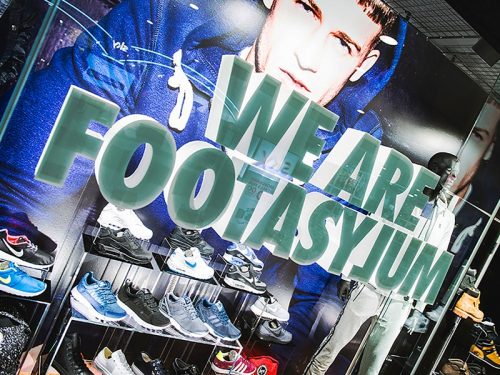Footasylum forced to issue warning on profits

Rochdale based Footasylum has warned that its revenue and earnings will fall below market predictions as it struggles to cope with tough conditions on the high street.
The trainer and shoe specialist has been forced to announce that EBITDA is expected less than half than the £12.5m previously forecast.
As a result, shares slumped 44%, falling 37p to 47p, on Monday morning.
The firm issued a trading statement which included a grim assessment on current trading in the retail sector.
Footasylum expects to report revenue of £98.6m, an increase of 18.5% compared to the corresponding period in the prior year.
Store revenue was up 12.4% to £66.3m, online revenue grew 28.5% to £30.2m, accounting for 30.6% of the total revenue and wholesale revenue trebled to £2.1m.
Footasylum has 66 stores in the UK with more openings expected.
Footasylum warned it expects to report a small adjusted EBITDA loss reflecting a lower gross margin and higher costs from investment in the company’s operations.
The company will also report over £2m of exceptional income (excluded from adjusted EBITDA) from the early termination of the lease on one of the Company’s Birmingham stores.
A statement said: “Whilst trading since the beginning of the current financial year has been impacted by weak consumer sentiment on the high street, the company’s store performance for May and June was positive, as reflected when the company gave guidance for FY19 in June.
“However, store performance during July and August was more challenging which, in the context of there being no sign of a recovery in the short-term on the high street, has led the board to reassess its overall expectations for the balance of FY19.
“While online and wholesale revenue continues to perform strongly year-on-year, store sales have been disappointing, which has been exacerbated by some unforeseen delays in the company’s new store openings and upsizes.
“Despite an ongoing programme of investment to drive sales, Footasylum’s revenue growth for FY19 2is now expected to be below current market expectations.
“As a result of this, and a lower overall gross margin from a higher amount of clearance activity in stores, the board now expects adjusted EBITDA for the full year to be significantly lower than previous guidance, at less than half of the FY18 adjusted EBITDA of £12.5m.
Barry Bown, executive chairman of Footasylum, said: “These are undoubtedly challenging times in the retail industry and, in common with many other businesses, Footasylum’s trading has continued to be impacted by weak consumer sentiment.”
“On top of that, increased clearance in stores has led to a reduction in gross margin, and we have also had some unforeseen delays in our new store openings and upsizes.
“However, we have continued our programme of investment, both in upsizing our stores and in our digital capabilities, and are working hard on a number of initiatives to maximise the Company’s performance during the upcoming peak trading period.
“Despite the challenging outlook, we are encouraged by the continuing progress that we are making in improving our online performance, rolling out our store opening programme, and further enhancing our supplier relationships, and therefore remain confident in the Company’s long-term prospects.”
Russ Mould, investment director at Salford Quays-headquartered AJ Bell, said: “The strong start retailer Footasylum made after its November 2017 IPO now feels an awful long time ago.
“After a damaging profit warning back in June, the company is now warning 2019 earnings will be significantly down on previous guidance at less than half the £12.5m it posted for the year to February 2018
“Management’s argument that its core, fashion-conscious 16-to-24-year-old demographic would continue to spend on trainers and t-shirts whatever the economic backdrop has been heavily undermined.
”The business has also not helped itself, pointing to unforeseen delays in new store openings and upsizing of existing outlets.
“Ultimately it is questionable whether investors will still share management’s continuing confidence in the ‘long-term prospects’ of the group.”








